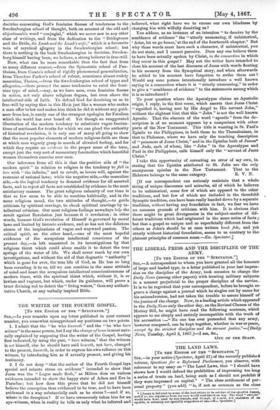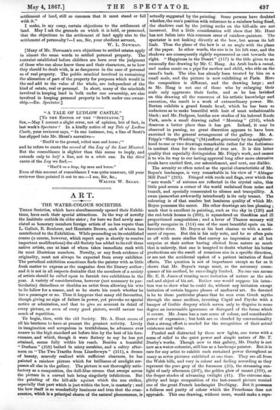THE LAND LAWS.
[To THE EDITOR OF THE " SPECTATOR."] SIR,—in your notice (Spectator, April 27) of the recently published volume, Questions for a Reformed Parliament, you observe, with reference to my essay on "The Land Laws, that "I should have shown how I would defend the prohibition of impressing too long a series of trusts on land, being such as I should not prohibit if they were impressed on capital." " The close settlement of per- sonal property " (you add) " is, if not as common as the close • [James Is belayed by some of the best critics to be neither of the apastles James r and if so, the argument from his ease would tend the one( way. The word " servanr would have been used by any disciple, and though, of Curse, not exclutlive of ea apostle, is certainly not specially suggrstire of one.—E.). spectator.]
settlement of land, still so common that it must stand or fall with it."
I make, in my essay, certain objections to the settlement of land. May I ask the grounds on which it is held, or presumed, that the objections to the settlement of land apply also to the settlement of personalty ?—I am, Sir, your obedient servant, W. L. NEWMAN.
[Many of Mr. Newman's own objections to settled estates apply in almost the same words to settled personal property. The restraint established before children are born over the judgment of those who can alone know them and their characters, as to how they should be dealt with, is as dangerous in the case of personal as of real property. The public mischief involved in restraining the alienation of part of the property for purposes which would in the end add to the value of the whole, are independent of the kind of estate, real or personal. In short, many of the mischiefs involved in keeping land in bulk under one ownership, are also involved in keeping personal property in bulk under one owner- ship.—En. Spectator.]































 Previous page
Previous page